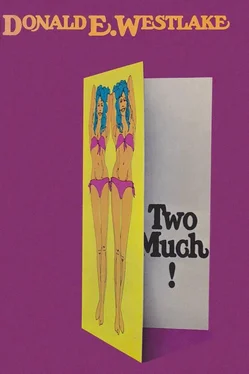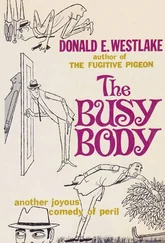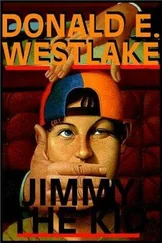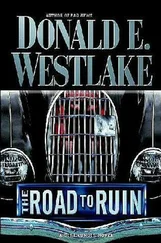Donald Westlake - Two Much!
Здесь есть возможность читать онлайн «Donald Westlake - Two Much!» весь текст электронной книги совершенно бесплатно (целиком полную версию без сокращений). В некоторых случаях можно слушать аудио, скачать через торрент в формате fb2 и присутствует краткое содержание. Город: Philadelphia, Год выпуска: 1975, ISBN: 1975, Издательство: M. Evans, Жанр: Юмористические книги, на английском языке. Описание произведения, (предисловие) а так же отзывы посетителей доступны на портале библиотеки ЛибКат.
- Название:Two Much!
- Автор:
- Издательство:M. Evans
- Жанр:
- Год:1975
- Город:Philadelphia
- ISBN:978-0-87131-168-9
- Рейтинг книги:3 / 5. Голосов: 1
-
Избранное:Добавить в избранное
- Отзывы:
-
Ваша оценка:
- 60
- 1
- 2
- 3
- 4
- 5
Two Much!: краткое содержание, описание и аннотация
Предлагаем к чтению аннотацию, описание, краткое содержание или предисловие (зависит от того, что написал сам автор книги «Two Much!»). Если вы не нашли необходимую информацию о книге — напишите в комментариях, мы постараемся отыскать её.
Two Much! — читать онлайн бесплатно полную книгу (весь текст) целиком
Ниже представлен текст книги, разбитый по страницам. Система сохранения места последней прочитанной страницы, позволяет с удобством читать онлайн бесплатно книгу «Two Much!», без необходимости каждый раз заново искать на чём Вы остановились. Поставьте закладку, и сможете в любой момент перейти на страницу, на которой закончили чтение.
Интервал:
Закладка:
“Making people laugh.”
“Below that,” she said “What is comedy really all about?”
“Acceptance,” I said. “The comic makes them laugh, so they don’t kill him.”
When she frowned, she looked like a daughter in a television commercial, learning about deodorants. “I know about that, too,” she said. “But there has to be something underneath it, something specific that makes this person or that person choose comedy instead of some other defense. So what is it?”
She was repeating herself, and boredom produces irritation. Taking a deep breath, I said, “Because the comic is a killer himself, that’s why. The comic is the last civilized man to feel the killer inside himself. We’re omnivores, little girl, and that means we’ll eat anything that stands still, we’ll eat anything that doesn’t have flashing lights. ‘Comedy instead of some other defense,’ you said, and that’s right. Comedy is surprise. I make you laugh, that means I surprise you, that means you’ll keep your distance, you won’t attack. Laugh meters should record in mega-deaths, because that’s what comedy is all about; I kill you for practice to keep you from killing me for real.”
She nodded, watching her pencil skate across the surface of the steno pad. Smiling to herself she said, “Well, it works.”
I frowned at her. “What works?”
Ignoring the question, she looked up at me again and said, “You’re saying the comic is a killer among killers, and he uses comedy both to hide his deadliness for social reasons and to show his deadliness as protection. And of course in your greeting cards the sharpened teeth show very clearly in the smile, don’t they?”
I said, “What works?”
She gave me a mock simper, the crowing of the smartass. “Ask the same question three times,” she said, “and the third time you’ll get the truth.”
“Very cute,” I said. But I hadn’t agreed to this interview to be annoyed.
Her smarmy grin went on and on. “The last civilized man to feel the killer alive inside himself,” she read, from her no-doubt perfect fucking shorthand. “Is that you?”
I walked around the desk, and her smile said she knew I would. I put her on the floor, and her smile said she’d known about that one, too. I played boy-girl upon her there, and twice I had the pleasure of seeing her look surprised.
15
Saturday afternoon on the beach at Point O’ Woods — not exactly the Riviera. Older duffers sat around in shirts and pants and hats, discussing debentures, while their wives nattered under beach umbrellas. A few younger women paddled here and there in the shallow water, but there wasn’t a bikini among them. Mostly they wore one-piece suits with little skirts, and some of them even had on white rubber bathing caps. There isn’t a woman in the world who doesn’t look as though she has fat thighs if she’s wearing a white bathing cap and a yellow one-piece bathing suit with a little skirt, so there wasn’t much to look at except the beach and the ocean and the cloudless sky and the pretty houses. But Bart didn’t care; now that he was alive, he was having a great time.
Alive. Charlie Hillerman had showed up Wednesday afternoon with a doctored photostat that looked almost good enough in the original to pass for the real thing. A Xerox of it was perfect, absolutely perfect. And in the meantime I’d mailed off two dollars to Kings County with a request for another copy of my own certificate, so now Art and Bart would both be able to prove their existences.
And what if Bart actually married Betty? The possibilities were intriguing. Art might simply disappear, for instance, leaving his debts behind him. Or I might accept a settlement for a quiet annulment after I’d revealed the truth. Or Bart might be the one to disappear (killed by me), leaving Art to inherit. I could kill him with Daddy’s gun.
Which had been a strange moment. Every once in a while in the turbulent life of man it becomes necessary to lubricate the ways, and on one such occasion in Daddy’s bed I’d reached for the night table drawer, on the dim chance there might be some K-Y jelly in there. Pawing away left-handed, while the rest of me was occupied elsewhere, I suddenly became aware that I was clutching a gun. “Yike,” I said, and lifted the thing out to stare at it A revolver, shortbarreled, grayish-black metal, surprisingly heavy. “Good God,” I said.
Betty, naturally, screamed; anyone would who found herself in bed with a naked man clutching a gun. The scream startled me, my hand flew open, and the gun dropped out of sight into the drawer again. I slammed the drawer, and would have stammered out something about the true object of my search except that Betty cried, “Be careful with mat! It’s loaded!”
“Loaded! Good Christ, what for?”
“We don’t know how to empty it,” she said, and looked at me hopefully. “Do you?”
“That’s the first gun I ever touched in my life,” I said.
“It was Daddy’s,” she said.
So much for Daddy’s sex life. And, for a while, so much for mine. But within a few minutes we both got back into the spirit of the enterprise again, and succeeded quite well after all without the help of the petrochemical industry. And I gave not another thought to the gun in the drawer. Of course, it didn’t occur to me then that anybody was ever going to use it.
However. Apart from that one bad moment with the arsenal, Bart’s life that week at Point O’ Woods was as sweet as an Armenian dessert. Romp romp romp with Betty in and around Father’s bed, late dinners out under the stars, and rest periods here on the beach. What could be better? Even Betty’s insistence on wearing a one-piece yellow bathing suit with a little skirt couldn’t dampen my spirit. Nothing could.
“Here comes Liz,” Betty said.
“Mm?” She hadn’t been around all week. Lifting my head from the sand — it was weighted down by both glasses and clip-on sunglasses — I looked off to the southwest, and here from the general direction of Dunewood came Liz. In a bikini, by God, a gleaming white one; suddenly I could hardly wait to be Art again.
But who was that with her? Squinting, I saw it really was Volpinex, the creature from the mummy case, slithering across the sand like an oil spill. His beach apparel was everything he’d worn in the office, minus the suitcoat and tie, and plus large dark sunglasses that made him look like a Greek millionaire’s hatchet man.
Betty and I got to our feet, and Liz smirking as though at some private joke, made the introductions. I have not met this man before . “Glad to know you,” I said.
He gave me a cold dry hand to shake (which I immediately gave back), and said, “I suppose your brother told you about me.”
Surprise and shock suddenly lit my features. “Oh! You’re the man who thinks I’m a fortune hunter.”
His smile turned sour; he hadn’t expected so direct a response in front of the ladies. His mistake had been in thinking I was another smart aleck like Art. Nevertheless, he was game, saying, “Not a fortune hunter .” With a nod toward Betty, who was blinking in delayed comprehension at the both of us, he said, “A fortune finder , I would say.”
“Ernest!” Betty cried, in outrage and astonishment, while Liz chuckled her dirty chuckle and said, “Ernie, you do have a knack.”
“And a responsibility,” he told her, his smile oozing around the words.
“Ernest,” Betty said, “are you accusing Bart of, of...”
“Not accusing,” Volpinex assured her. Lifting one finger, as though making a point he particularly wanted the jury to think about, he said, “I consider it a possibility only. But given my role in your affairs, it’s a possibility I most certainly must take seriously.”
Читать дальшеИнтервал:
Закладка:
Похожие книги на «Two Much!»
Представляем Вашему вниманию похожие книги на «Two Much!» списком для выбора. Мы отобрали схожую по названию и смыслу литературу в надежде предоставить читателям больше вариантов отыскать новые, интересные, ещё непрочитанные произведения.
Обсуждение, отзывы о книге «Two Much!» и просто собственные мнения читателей. Оставьте ваши комментарии, напишите, что Вы думаете о произведении, его смысле или главных героях. Укажите что конкретно понравилось, а что нет, и почему Вы так считаете.












